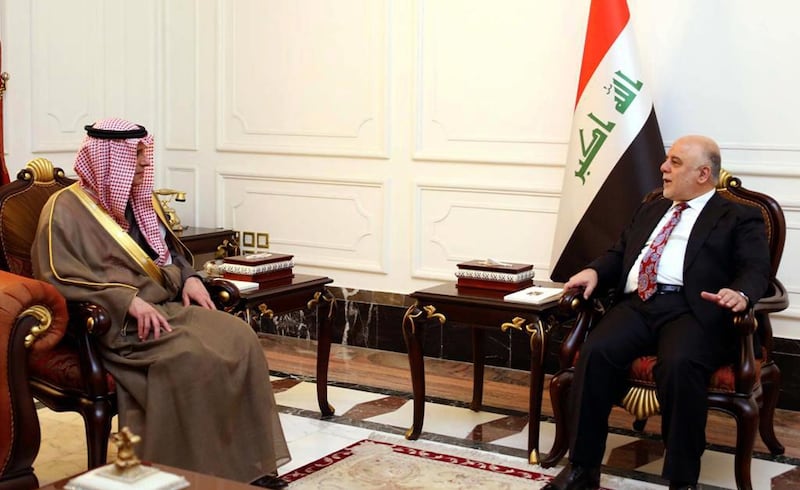ABU DHABI // Saudi foreign minister Adel Al Jubeir visited Baghdad for talks with his Iraqi counterpart and the prime minister on Saturday – the first trip by a foreign minister from Riyadh since 1990.
“It’s the hope of kingdom of Saudi Arabia to build excellent relations between the two brotherly countries,” Mr Al Jubeir said after meeting Iraqi prime minister Haider Al Abadi.
“There are also many shared interests from fighting extremism and terrorism or opportunities for investment and trade between the two countries.”
Mr Al Abadi’s office said the two men “discussed cooperation in various fields, including the fight against the Daesh gangs”.
The Saudi foreign minister also met his Iraqi counterpart, Ibrahim Al Jaafari.
In his talks with Iraqi officials, Mr Al Jubeir said Riyadh planned to appoint a new ambassador to Baghdad, according to an Iraqi foreign ministry official.
After 25 years without a permanent envoy in Iraq, Saudi Arabia sent an ambassador, Thamer Al Sabhan, to Baghdad at the beginning of last year. But Mr Al Sabhan was forced to leave his post by Iraq less than a year later after he said Iran-backed Shiite militias in the country were exacerbating tensions with Sunni Arabs.
In his remarks following the talks with Mr Al Abadi, the Saudi foreign minister stated Riyadh’s willingness to help bridge the sectarian divide in Iraq.
“The kingdom stands at an equal distance from all Iraqi communities making up Iraq and supports the unity and stability of Iraq,” he said.
Relations between Baghdad and Riyadh remained tense and very limited after 2003, as Saudi Arabia’s arch-rival, Iran, became an increasingly powerful military and political player in Iraq where Shiite Arabs make up the largest demographic. Shiite political factions do not uniformly support Iran’s influence, however.
Riyadh has mostly chosen to disengage from Iraq and has not had a significant influence among the country’s Sunni communities or political and insurgent groups – although Iraqi politicians and officials have routinely accused the kingdom of supporting extremists like ISIL.
Mr Al Abadi has supported attempts to improve relations with Riyadh since taking office in September 2014, months after ISIL overran large areas of Iraq and as Shiite militias backed by Iran grew in size and power. This growth came as the Popular Mobilisation Units (PMU) – a state-sponsored umbrella organisation made up of mostly Shiite militias – was formed and became key to pushing back the extremist group.
It is not clear what the motivations behind the moves to thaw bilateral relations are, or whether Mr Al Abadi or his allies hold out serious hopes that Arab Gulf states with their financial heft can play a positive role in Iraq and serve as a counterweight to Iranian influence.
Implying the United States is brokering the thawing of relations between Riyadh and Tehran, former Iraqi finance minister Hoshyar Zebari, who was sacked last year, said on social media: “Today’s visit to Baghdad by [the Saudi foreign minister] ... is an excellent move to normalise Iraq-Saudi relations. Thanks to our American friends.”
Mr Al Jubeir’s trip came a week after Iranian president Hassan Rouhani made his first visit to Kuwait since taking office, in a stated bid to initiate a dialogue with the GCC and reduce tensions. That visit took place amid heightened fears of a military confrontation in the region, with the new US administration saying it will seek a policy of containing Iran, rather than trying to engage it as former president Barack Obama had sought to do.
Some observers of Arab Gulf-Iran relations also speculated Mr Rouhani’s trip may have been intended to drive a wedge between GCC countries on how to approach Tehran.
Days after Mr Rouhani’s trip, Mr Al Jubeir made strident remarks at the Munich Security Conference saying Iran and ISIL have a deal not to attack each other, and dismissing Tehran’s calls for talks with the GCC.
“How can one deal with a nation whose objective is to destroy us?” he said. “So until and unless Iran changes its behaviour, and changes its outlook ... it will be very difficult to deal with a country like this.”
foreign.desk@thenational.ae
* Additional reporting by Reuters and Agence France-Presse





